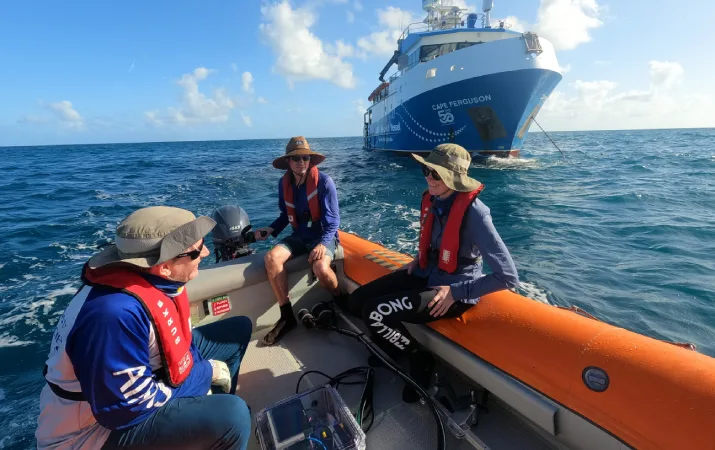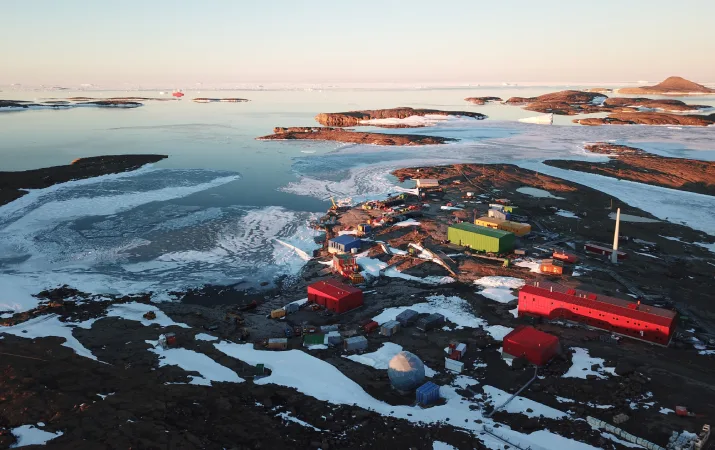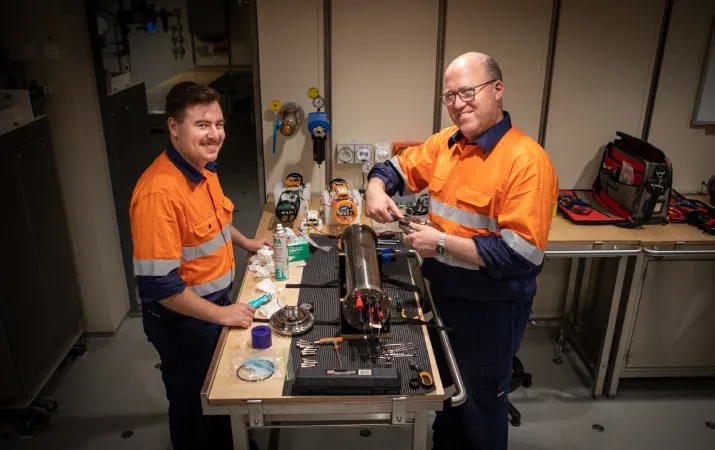What do engineers actually do?
By Chloe Cann
Interested in engineering, but not sure what a career in the field looks like? From working on the Great Barrier Reef to designing equipment for use in Antarctica, two professionals tell all.
Engineers are responsible for so many aspects of our modern lives that we take for granted. They design rollercoasters, and the tech behind TV and radio. Develop space shuttles. Fabricate windscreen wipers. Invent artificial organs.
Given the array of potential jobs available, and the range of qualifications on offer, it can be hard to know where to start if you’re thinking of becoming an engineer. And trying to imagine what your day-to-day life might actually look like once you graduate can sometimes prove even harder.
If you’re toying with the idea of studying engineering, but want to learn more about the industry and what your would-be job might entail, then read on.
Types of engineers
Engineers Australia, the national body for engineering, recognises 16 areas of engineering. Some of these highly specialised fields include telecommunications engineering, aerospace engineering, and fire safety engineering. But traditionally, engineers worked across five broad disciplines: chemical, civil, electrical, mechanical and structural.
In broad terms:
A civil engineer helps design and create infrastructure, such as buildings, roads, bridges, tunnels and airports.
Structural engineering is considered a discipline of civil engineering. Structural engineers focus exclusively on designing and examining building infrastructure, from formulating earthquake-proof skyscrapers to ensuring the integrity of oil rigs.
A mechanical engineer helps design and create machines and mechanical devices, such as elevators, escalators, cars, planes and robots.
An electrical engineer helps design and create electrical systems and devices, such as electric motors, smartphones, and navigation systems.
A chemical engineer turns raw materials into everyday products, working across everything from pharmaceuticals to cosmetics, clothing, construction and food processing.
What do engineers do all day?
It’s all very well talking hypothetical job specs and engineering courses, but what’s daily life actually like for an engineer?
De’vereux Harvey is a mechanical engineer at the Australian Institute of Marine Science (AIMS). She splits her time between AIMS’s engineering workshop in Townsville and the field, and plays a key role in supporting the health of critical marine ecosystems such as coral reefs.
Like any good engineer, De’vereux’s work revolves around solving problems. In this case, the issues faced by AIMS were that traditional methods of coral reef monitoring were expensive, labour-intensive, and limited by safety considerations and logistics.
“I’m currently working on the design and development of the ReefScan—a suite of camera and sensor systems with machine learning capability to support reef health monitoring and object identification,” she explains.

ReefScan translates field data into comprehensive information about the state and health of marine ecosystems. And De’vereux helps to develop and test ReefScan’s camera housing, and the restraints and hardware that hold it to the boat.
“My average day can vary depending on [the] stage of the project,” she says. “I spend most of my time in the workshop at AIMS, using computer-aided design (CAD) software to design components, then working with the AIMS engineering team and external contractors to get parts fabricated to build the ReefScan camera systems.”
“I also spend a few weeks of the year on field trips, working out on the reef to test the camera systems, train other users and support science projects. It’s exciting to be able to see our designs become tangible product[s] and have an impact.”
What engineering field trips can look like
Like De’vereux, mechatronics design engineer Will Rigby also spends a lot of his time developing marine cameras. Except his designs must withstand very different conditions.
A member of the Australian Antarctic Division’s (AAD) Polar Technology team, he’s based in Hobart; but participating in field trips to the ‘White Continent’ aboard icebreaker RSV Nuyina is also part of the job.
Using his knowledge of mechatronics (a mash-up of electrical, mechanical and software engineering), Will designs electronics and mechanical assemblies and develops software for deep sea scientific systems and autonomous weather stations deployed in Antarctica. And dreaming up creative solutions to unusual problems is his bread and butter.
“[There’s] a lot of planning around power,” he explains of the weather stations he’s helped to pilot. “Because the thing's got to get through winter and it's not going to get any sun. So [there’s] a lot of work around finding components that are rated down to negative 40 and trying to really reduce the power consumption.”

Once the weather stations are set up, they are rarely, if ever, visited, so reliability is a key factor in their design. But beyond longevity of the instruments AAD uses, Will also has to consider other elements that form part of the end-to-end process in this unique environment.
Of the automatic weather stations, for example, he explains: “You want to use some really big bolts, bigger than you normally would, so that you don't have to take your gloves off to assemble things.”
Day to day, Will works between the office space, where he focuses on circuit board design, writing code and answering emails, and the electronics lab where he can set up equipment and test his designs.
Is it hard to get a job as an engineer?
Having gravitated towards maths and physics at school, De’vereux felt that engineering was a “natural choice” for her future career and chose to study mechanical engineering and business management at university.
“I was fortunate to secure a position in a graduate program prior to finishing my degree,” she says. “However, it was fairly competitive at the time, and I applied to a number of companies before landing a job.”
De’vereux worked in the manufacturing and defence industries for several years and then decided to return to university.
“I’m an avid scuba diver and had an interest in marine conservation and marine renewable energy [so] I started a PhD in ocean fluid mechanics in the hopes of moving into a marine science and technology field.”
De’vereux came across AIMS and its work during her studies and managed to land her current job in marine mechanical engineering.
Whatever your pathway into engineering, De’vereux stresses the value of the transferable skills that you’ll learn along the way. “Although there was a learning curve when I started at AIMS, moving to a new industry wasn’t particularly difficult,” she notes.
Will, meanwhile, highlights the importance of always taking a shot at your dream career.

“So I had a co-worker at my last job who was talking about going for a position down on the station [in Antarctica, with AAD]. And I [said] ‘oh, I’ll have a look’. They had [another] job going at the time for a design engineer.”
Will imagined that the recruitment process would be “really competitive” and presumed that he wouldn’t have a chance of getting it, but decided there was no harm in applying. Next thing you know, he was offered the role.
“My piece of advice for anyone that’s considering engineering, is always have a crack at opportunities. You may not get them, but it's always worth trying. I've heard that from so many other people who got cool jobs; they just saw an opportunity, weren't sure they’d get it and threw their hat in the ring."
Is engineering still a good career option?
In a word, absolutely. According to a 2023 report released by Engineers Australia demand for engineering skills has exceeded supply, despite an increase in qualified engineers between 2016 and 2021. That means the skills shortage in engineering is growing at three times the rate of the general workforce.
The report also shows that 87% of engineering graduates in Australia were in full-time employment in 2021 and 2022; a figure nearly 10% higher than the average across all fields of study.
And beyond the strong employment outcomes, the report also reveals that engineering graduates earn among the top five highest graduate salaries, with a median of $71,500.
Which engineering job has the highest salary?
According to online job site Indeed, data engineers receive the highest incomes in Australia, taking home a national average salary of $127,666 each year. They’re followed closely by petroleum engineers ($127,609), chemical engineers ($99,964), software engineers ($98,331), and electrical engineers ($98,126).
If you think a career in engineering might just be your calling, then explore these online engineering courses offered with leading universities through Open Universities Australia.
Or read more about how to find an internship in the field.



